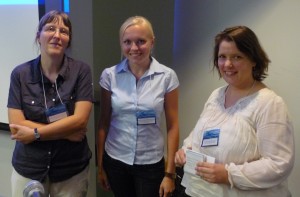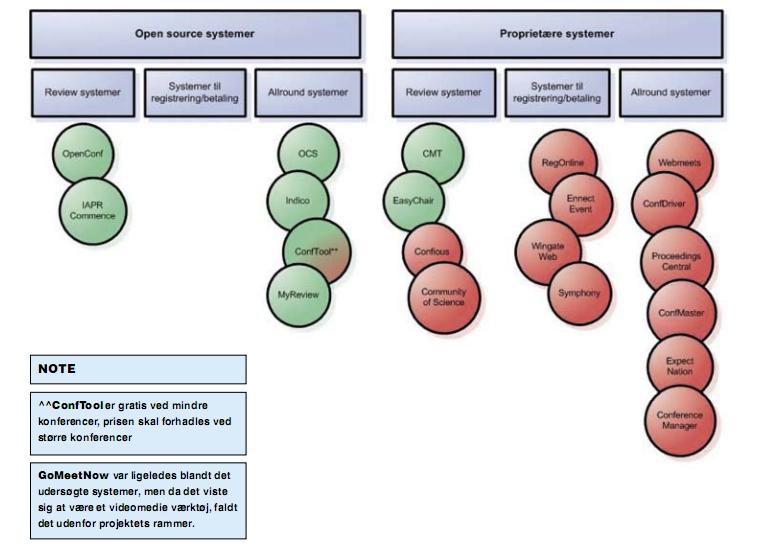Presenters:
- Heidi Drasbek Martinussen, System Librarian, Technical University of Denmark
- Helle Damgaard Andersen, Webmaster, IT Department for Library and Web, Copenhagen Business School
- Kirsten Suhr Jacobsen, Conference Consultant, Copenhagen Business School Library

Time: 2:30-3:30 pm, July 9th, 2009
Place: SFU Harbour Centre, Earl & Jennie Lohn Room 7000
———————————————————————————————
Session Overview
Beginnings
Denmark’s Electronic Research Library (DEFF) began a project in 2008 to review twenty open source and proprietary conference management systems and to test out the three that were best suited for research libraries (i.e. includes functionalities such as registration/payment, review process, etc.) This project was carried out collaboratively by the Technical University of Denmark (DTU), Aalborg University, and Copenhagen Business School (CBS); each institution was to test out seven systems, respectively.
The following diagram represents the various characteristics of the systems, such as those that only support review or registration/payment functionalities, as well as pricing – red denotes that the system was VERY EXPENSIVE.
(source)
Following the preliminary testing stages, the three institutions each chose one of their seven conference management systems, and carried out pilot projects on the selected system:
1) Proceedings Central tested by Aalborg University
Proceedings Central (now ScholarOne Proceedings) was a proprietary system developed by Thomson Reuters. While it had many benefits, its major downfall was that it was expensive and only supported review functionalities, much more like the Open Journal Systems (OJS) publication system. In addition, it was frustrating to use outside of North America because the system was configured to follow US time only.
2) Indico tested by the Technical University of Denmark
The Technical University of Denmark (DTU) has been using the Indico system for several years now. It is an open source system that was originally developed by the European Organization for Nuclear Research (CERN) and supported by the European Union. Its greatest advantage is that it makes registration very easy– setting up registration forms can take as little as half an hour. The major challenge with Indico is that the system is not aesthetically pleasing, but they are currently working on developing a better looking version that is expected to be available in the fall. The presenters likened Indico to the ‘little brother’ of Open Conference Systems (OCS) as its functions are very comparable to the latter.
3) Open Conference System (OCS) tested by the Copenhagen Business School
The Open Conference System (OCS) was developed from OJS system and thus has inherited characteristics that are not always best suited for the needs of a conference management system. An example of this is that it is difficult to set up individual conferences– they must be set up as annual conferences.
Conclusions
While there are still many items on the presenters’ wish-list for OCS, the system seems to be the best so far in terms of designs, the building of the conference site, and multilingual support. It also has a large community of users behind it, and includes a wiki, as well as a support and user discussion forum.
Future Directions – a further look into the systems
The goal for the current project is to have DTU run fourteen conferences with Indico in 2009, and CBS run seven conferences with OCS to further develop and examine the respective systems. DTU and CBS also hope to collaboratively develop a ‘light’ version of OCS, that has fewer functions to better:
- provide for a quick set up for registration,
- support a conference that already has its own webpage, but requires payment and review functions,
The Role of the Library
The presenters also highlighted the role of the library in relation to the use of conference management systems. The library can serve as technical/user support, act as a central solution and housing for conferences, as well as provide payment system integration so that users are not limited to using PayPal.
Questions
Comment: Fantastic work. It is exciting to see someone to push forward OCS. Major problem with both OJS is that everyone is going in different directions. The more institutions pick up OCS, the more polish and fine-tuning it is going to get. Good to get feedback. This is the advantage to open source– this is how the software improves! And an obvious sign that the community works effectively.
Question: What is the volume for abstracts, attendees, etc. (that is provided by OCS)? Answer: Very wide range.
Question: How did you come down to deciding on Indico and OCS? Did you use a checklist for all the technical requirements for the 20 systems? Answer: Yes.
Question: Is there any proprietary system that has similar functional abilities of OCS and at reasonable price range? Answer: It is very difficult to get prices out of proprietary systems and functionality is usually very unclear-“this system does it all” seems to be the standard response.
References
Martinussen, H., Damgaard, H., Jacobsen, K., & Pedersen, J. (2008). Nye veje for forskningsbibliotekerne? conference management systems. DF Revy, 31(8), 21-23.
Related Links
